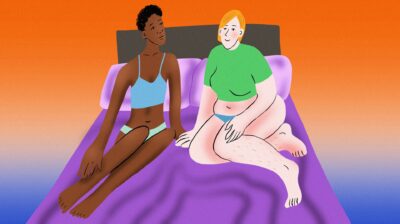How our mental health impacts our sex lives
Laura has some tips for feeling comfortable and enjoying your sex life.

Sex is so important for many of us because of our desire for connection, intimacy and affection. Our sex life can influence our emotional and psychological well-being. Similarly, our psychological well-being is important for our sex life and in shaping our thoughts and behaviours around sex.
According to the World Mental Health Organisation, 20% of all individuals will suffer from mental health issues at some point in their lives. Although you may not be one of these individuals, someone you are intimately or sexually involved with may have mental health issues.
In this piece, I want to share my and some of my peers’ experiences of mental health issues and how they have affected our sex lives. I will share some tips which we hope will break down the barriers that mental health struggles may impose on your sex life.
Sex and mental health
Only a certain portion of your sex life is physical. A huge part is linked to the brain and the chemicals which are responsible for arousal, pleasure and reward. For many people with mental health issues, there may be a chemical imbalance in the brain which can interfere with the arousal or pleasure response. Anxiety or depression can strongly affect arousal and can make it difficult to enjoy yourself because of intrusive thoughts or worries around performance, partner’s perception, etc.
A friend of mine once described “an overwhelming need for love and affection”, which was always tainted by anxiety. She spoke of how the thoughts driven by her anxiety “would create a dream-like state which made intimacy difficult to enjoy.” This has been echoed by many of my peers over time. Others have also described how “oversensitivity of the skin” caused by anxiety has made “touching and kissing unbearable.” While some people may have sensory issues generally, sometimes these issues seem to be closely linked to someone’s self-esteem.
Self-esteem and self-love
I have spoken to many friends who have reported feeling unworthy of sexual attention due to how they see their bodies. Many have spoken about how they feel their ‘wobbly bits’ could never compare to the perfectly airbrushed bodies on social media. One of the side effects of antidepressants is weight gain, which can also affect sexual confidence. Friends have described feeling unhappy with their bodies and not believing a partner when they say they are attracted to them. This type of friction can cause issues in sexual and romantic relationships.
Medication, including anti-depressants, can affect your libido, arousal and orgasms. The effect of medication combined with living with a mental health condition can have a significant impact on your sex life and has, in some cases, caused relationship issues due to a lack of understanding from partners. Feelings of inadequacy can also be transferred to partners, completely unintentionally. If you think your medication is affecting your sex life, you can talk to your GP about it.
Here are some of our tips for feeling comfortable and enjoying your sex life:
Sensuality
Sex is far more than the physical act. Laughter, clumsiness, creativity, differing levels of desire, exploration and adventure are all part of the experience. Remembering these are important elements of your sex life can decrease anxieties, intrusive thoughts and boost your mood. It is useful to take the pressure out of sex and plan sensual activities that do not have to end in sex such as back massages or a couples’ bubble bath. Changing the expected outcome allows you to focus on the connection, pleasure and intimacy without the pressure.
Communication
Communication is key to establishing a level of trust and talking through any frustrations. Everyone involved must understand and respect the impact that mental health may be having on their sexual relationship. It is also necessary to ensure that no one leaves a sexual encounter feeling misunderstood, unattractive or undesired. The self-esteem of both partners can be affected by the mental health issues of one.
Being sex positive
This movement encourages us to recognise that sex is a positive part of many people’s lives. It is not a shameful or naughty activity which should be concealed. This encourages and allows free expression of our desires and sexual orientation. The aim of sex positivity is to allow us to become more comfortable in our own bodies through self-exploration and the use of masturbation and self-pleasure. It also highlights how sex is a healthy part of life and why it’s important to be supportive of other people’s sexual behaviour and orientation. We must acknowledge that sometimes you or your partner may not want to have sex, and that is also natural. Sex positivity encourages an open and honest conversation about our sex lives and is a huge movement which can be followed online.
Mental health issues can impact all areas of your life, and your sex life is no exception to that. Living with mental health issues can sometimes be draining, all-consuming and can present some barriers to enjoying a fulfilled sex life. A lot of the barriers can be associated with self-esteem and feeling comfortable in your own skin. It is important to bring it back to basics and foster the connection and intimacy that sex can bring.
Feeling overwhelmed and want to talk to someone?
- Get anonymous support 24/7 with our text message support service
- Connect with a trained volunteer who will listen to you, and help you to move forward feeling better
- Whatsapp us now or free-text SPUNOUT to 50808 to begin.
- Find out more about our text message support service
If you are a customer of the 48 or An Post network or cannot get through using the ‘50808’ short code please text HELLO to 086 1800 280 (standard message rates may apply). Some smaller networks do not support short codes like ‘50808’.






